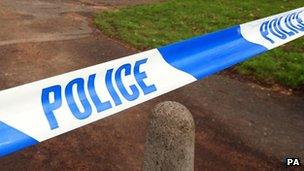Watchdog queries government adverts for police elections
- Published

The elections are taking place across England and Wales
A government advertising campaign to promote police commissioner elections risks undermining confidence in the polls, the elections watchdog has said.
The Electoral Commission has raised concerns about the repercussions for the polls if voters and candidates "question the neutrality" of the ads.
It was a "significant departure from usual practice" for the government to do its own public awareness campaign.
The Home Office said the TV and radio campaigns would be fair.
Elections will be held in 41 regions across England and Wales on 15 November to choose police and crime commissioners - who will replace the currently appointed police authorities.
The Electoral Commission is planning its own TV, radio and newspaper advertising campaign in the run-up to polling day, starting on 22 October.
'Public confidence'
The ads will draw attention to a booklet being sent to voters in each police election area - containing "factual" information about the role of police commissioners, how voters should fill in their ballot papers and details of the website and phone number from which people can get candidate information.
In a briefing for MPs about the elections, the Electoral Commission said it had learnt the government was planning its own TV and radio campaign starting early next month.
It said it had raised concerns with the Home Office about the government "undertaking an advertising campaign ahead of these or any elections".
"This is a significant departure from usual practice and if questions are raised about the neutrality of it by voters or candidates it could affect public confidence in the elections," it said.
"The government has assured us it is aware of these concerns and has taken the decision to proceed."
"While we do not agree with these decisions, our focus is now on making the arrangements work for voters," the watchdog added.
The watchdog has already questioned how the government is making candidate details available to the public, after ministers rejected its call for a booklet containing such information to be sent to every household on the grounds of cost.
The information will instead be contained on a website with a written booklet available on request.
The chair of the commission, Jenny Watson, said it was "crucial" voters were engaged with the issues and the candidates before November's poll.
"People don't vote because they know how to, they vote because they care about what's at stake. So it's now down to the candidates to give people a reason to vote," she said.
'Landmark change'
The Home Office said the government's advertising campaign would be run "with the utmost consideration for fairness and propriety".
A spokeswoman said the campaign would seek to explain the role of PCCs and encourage people to vote in the elections for whichever candidate they choose, while the watchdog would be responsible for explaining the mechanics and timing of the election.
"This is a landmark change and the public has a right to take part in the biggest reform to policing in over 50 years," she said.
"A mailshot would cost up to £30m, which in the current economic climate is not a justifiable expense. We are confident members of the public will be able to access all the information they need."
The minister widely seen as the driving force behind directly elected police commissioners, former policing minister Nick Herbert, resigned in last week's government reshuffle.
- Published17 August 2012
- Published14 August 2012
- Published15 August 2012